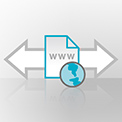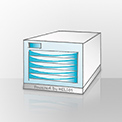LPR printing system
- The LPR printing system now allows file sizes up to 8.3 million TB (64-bit). The old 32-bit support can only handle print jobs no larger than 2 GB
- TCP/IP access list support
Password security
- The server password utility now supports password lengths up to 64 bytes
- An option allows to output the encrypted password to be printed to standard output to allow integration into custom password management solutions, e.g. web CGI-scripts
HELIOS Update Installer
- The HELIOS Update Installer (is now automatically installed)
- Automatic updates download from www.helios.de

HELIOS Update Installer
TCP/IP Service Location Protcol (SLP)
Our software supports the Service Location Protocol (SLP), which allows users under UNIX systems to find available services without any knowledge of host names. Under Mac OS X, SLP is preferred over the old AppleTalk Name Binding Protocol (NBP) and will replace it in the future.

User Agents (UA)
This is basically the software that the user or a service uses to register, deregister and find services. Examples for such User Agents are the “slptool” or the “Network Browser” under Mac OS 9.x or Mac OS X.
Service Agents (SA)
An SLP Service Agent is responsible for storing information of services on a single system, answers User Agent calls and informs Directory Agents of local information changes. Examples of such Service Agents are HELIOS SLP servers on systems with a single network interface, or Mac OS 9.x and Mac OS X clients with activated File Sharing.
Directory Agents (DA)
These agents act as a central repository of a network. It collects the information of Service Agents to build a complete database of the whole network, which can be accessed by User Agents. A HELIOS SLP server on a computer with several network interfaces becomes Directory Agent by default.
The “slptool” is used to list, register or deregister services. All servers will respond to service lookups and control local registration (Service Agent support). If a service fails it is deregisterd within 15 seconds so it is not visible any more on the network. Routing of registrations between multiple network adapters is done via Directory Agent support. And with centralized SLP servers which collect server registrations instead of default multicasts from service agents, server identification is accelerated which leads to a faster request handling. TCP/IP SLP Scopes are similar to the “Zones” in AppleTalk (NBP).

“Connect to Server” dialog







EtherShare Admin “Connect to Server” dialog
-
Manual registration is supported
(e.g. register a Windows 2000 server using the HELIOS SLP server) -
Sample registration looks like:
esmail://172.16.0.1/?NAME=sunserver,165
afp://172.16.0.1/?NAME=sunserver,165
esadmin://172.16.0.1/?NAME=sunserver,165
opievent://172.16.0.1/?NAME=sunserver,165

EtherShare Admin “SLP Scope” section in the Server Settings dialog window
HELIOS Service Controller
The HELIOS Service Controller controls and monitors a separate process per service, and also a separate process per active user. This offers considerable advantages, e.g.:
- Server fail safety, i.e. if one or more processes fail, the other running processes are not affected
- Much faster starting and stopping of all products
- Easier stopping/starting of a single service
- Complete logging of all errors
- Third-party applications can integrate their services into the HELIOS Service Controller (via preferences)

HELIOS Service Controller
Central “start-stop” script folder
- A custom script which will be started automatically during startup/stop of the HELIOS server
Unicode conversion utility
“uniconv”, the new HELIOS Unicode conversion utility, allows the conversion of text strings from one encoding to another, e.g.:
- MacRoman to PC-850
- PC-850 to UCS-16 (16-bit MSB)
- PC-850 to UTF-8
- MacRoman to UTF-8
- SJIS to ISO8859-1
HFS support for Mac OS X
At present the HELIOS products on Mac OS X are supported on UFS formatted disks. In addition to the UFS file system, our upcoming products (EtherShare 3.1, PCShare 3.1, …) will support HFS formatted disks as well. This leaves the decision of which file system to use to the customer. All Mac OS X disks are formatted with HFS by default. We have had many customers asking for this feature.
More Unicode support
- Support for Korean character sets (EUC-KR)
- Support for Icelandic character sets
- Additional encodings can be added via HELIOS SDK
Easier HELIOS product installation with the HELIOS Software Installer

HELIOS Software Installer
HELIOS Installer installs all selected products in one step. This means:
- You will benefit from a much faster installation
-
No server rebooting is required
Note: Mac OS X as HELIOS server platform must be rebooted! - The user is not asked any questions during the installation process
- The HELIOS Services start automatically after the installation has been completed

HELIOS Software Installer
New HELIOS directory structure

HELIOS directory structure
The new HELIOS directory structure offers:
- Central configuration of files/meta data
- Full configuration compatibility between all HELIOS platforms
- Copying of the “/usr/local/helios/var” directory, which contains all product settings, so it can be copied between different servers, e.g. Mac OS X and Sun
-
Preserving of all settings, including:
Volume settings, Printer settings, OPI settings, ICC settings, Font settings, PPD settings, Printer Inits, etc.
Starting the server anew (“start-helios” script) will then automatically use the new settings from the “/usr/local/helios/var” directory.


 Enterprise Server
Enterprise Server
 Developers / SDK
Developers / SDK
 Retail / Industrial
Retail / Industrial
 Newspapers / Publishers
Newspapers / Publishers
 Photographer / Studios
Photographer / Studios
 Ad Agencies / Premedia / Printers
Ad Agencies / Premedia / Printers
 Video & Entertainment
Video & Entertainment
 Cloud Collaboration
Cloud Collaboration
 HD Color
HD Color
 Image Processing
Image Processing
 Proofing
Proofing
 WebShare Connectivity
WebShare Connectivity
 Workflow Automation
Workflow Automation
 File Server
File Server
 Press Releases
Press Releases  Videos
Videos  Newsletters
Newsletters  Events
Events